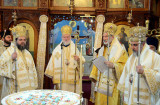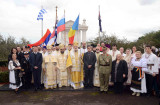25 Jul 14: In Memory of the 100 Year Anniversary of World War I
 With the blessing of the Assembly of Canonical Orthodox Bishops of Oceania on 19 July 2014 a Pan-Orthodox Divine Liturgy and Memorial Service was held in memory of the 100 year anniversary of World War I. The service was held at the Northcote Greek Orthodox Monastery, Melbourne where members of the clergy of the Greek, Antiochian, Russian, Serbian and Romanian Orthodox Churches in Australia served in their native language.
With the blessing of the Assembly of Canonical Orthodox Bishops of Oceania on 19 July 2014 a Pan-Orthodox Divine Liturgy and Memorial Service was held in memory of the 100 year anniversary of World War I. The service was held at the Northcote Greek Orthodox Monastery, Melbourne where members of the clergy of the Greek, Antiochian, Russian, Serbian and Romanian Orthodox Churches in Australia served in their native language.
The Great War 1914 1918
The catastrophe that history was to call “The First World War,” had been long in the coming; the spark was the assassination of Archduke Franz Ferdinand, heir to the Austro-Hungarian throne, in Sarajevo on 28 June 1914. Ferdinand’s death at the hands of a Serbian nationalist set in train a mindlessly mechanical series of events that culminated in the world’s first global war. In reality, the reasons for the war were already in place a generation earlier.
Austria-Hungary’s reaction to the death of their Crown Prince was three weeks in coming. Arguing that the Serbian government was implicated in the machinations of the Black Hand (whether she was or not remains unclear, but it appears unlikely), the Austro-Hungarians opted to take the opportunity to stamp its authority upon the Serbians, crushing the nationalist movement there and cementing Austro-Hungary’s influence in the Balkans.
It did so by issuing an ultimatum to Serbia which, in the extent of its demand that the assassins be brought to justice effectively nullified Serbia’s sovereignty. Austro-Hungary’s expectation was that Serbia would reject the overly severe terms of the ultimatum and thereby giving her a pretext for launching a limited war against Serbia.
However, Serbia had historical ties with Russia, an altogether different proposition for Austria-Hungary. Whilst not really expecting that Russia would be drawn into the dispute to any great extent other than through words of diplomatic protest, the Austro-Hungarian government sought assurances from her ally, Germany, that she would come to her aid should the unthinkable happen and Russia declared war on Austria-Hungary.
Germany readily agreed and even encouraged Austria-Hungary’s warlike stance.
Consequently, we have a remarkable sequence of events that led unfailingly to the ‘Great War’.
- Austria-Hungary, unsatisfied with Serbia’s response to her ultimatum which in the event was entirely reasonable: did not stop Austria-Hungary from declaring war on Serbia on 28 July 1914.
- Russia, bound by treaty to Serbia, announced mobilisation of its vast army in her defence.
- Germany, allied to Austria-Hungary by treaty, viewed the Russian mobilisation as an act of war against Austria-Hungary, and after scant warning declared war on Russia on 1 August.
- France, bound by treaty to Russia, found itself at war against Germany and, by extension, on Austria-Hungary following a German declaration on 3 August. Germany was swift in invading neutral Belgium so as to reach Paris by the shortest possible route.
- Britain, allied to France, declared war against Germany on 4 August. Her reason for entering the conflict lay in another direction: she was obligated to defend neutral Belgium by the terms of a 75-year old treaty. With Germany’s invasion of Belgium on 4 August, and the Belgian King’s appeal to Britain for assistance, Britain committed herself to Belgium’s defence later that day. Like France, she was by extension also at war with Austria-Hungary.
- With Britain’s entry into the war, her colonies and dominions abroad offered military and financial assistance, and included Australia, Canada, India, New Zealand and the Union of South Africa.
- United Statesdeclared a policy of absolute neutrality, an official stance that would last until 1917 when Germany’s policy of unrestricted submarine warfare – which seriously threatened America’s commercial interests and forced the U.S. to finally enter the war on 6 April 1917.
- Japan, honouring a military agreement with Britain, declared war on Germany on 23 August 1914. Two days later Austria-Hungary responded by declaring war on Japan.
- Italy, although allied to both Germany and Austria-Hungary, was able to avoid entering the fray by citing a clause enabling it to evade its obligations to both. In short, Italy was committed to defend Germany and Austria-Hungary only in the event of a ‘defensive’ war; arguing that their actions were ‘offensive’ she declared instead a policy of neutrality. The following year, in May 1915, she finally joined the conflict by siding with the Allies against her two former allies.
But, in reality, the seeds of war were well and truly sown in the 19th century.
The competing interests of the European colonial powers constantly dictated the making and breaking of alliances. The newly created German Reich by Otto von Bismarck developed in the Germans an appetite for colonial expansion in Africa and a larger share of central Europe. This brought Germany into direct conflict with France, and with Germany looking towards Africa, Britain saw Germany as a rival both in Africa and on the high seas.
Bismarck began negotiating, in 1873, the Three Emperors’ League, which tied Germany, Austria-Hungary and Russia to each other’s aid in time of war. This however only lasted until Russia’s withdrawal five years later in 1878, leaving Bismarck with a new Dual Alliance with Austria-Hungary in 1879.
This latter treaty promised aid to each other in the event of an attack by Russia, or if Russia aided another power at war with either Germany or Austria-Hungary. Should either nation be attacked by another power, e.g. France, they were to remain – at the very least – benevolently neutral.
This alliance, unlike others, endured until war in 1914. It was this clause that Austria-Hungary invoked in calling Germany to her aid against Russian support for Serbia.
Austria-Hungary signed an alliance with Romania in 1883, negotiated by Germany, although in the event Romania – after starting World War One as a neutral – joined the Allies after the brilliant success of the Russian Army under General Busilov – known as the Brusilov Offensive of June 1916; as such Austria-Hungary’s treaty with Romania was of no actual significance.
Bismarck wishing to avoid the possibility of a two-front war against both France and Russia signed a secret treaty with Russia in 1887, the so-called, Reinsurance Treaty.
The year after the Reinsurance Treaty lapsed in 1890, Russia allied itself with France. Both powers agreed to consult with the other should either find itself at war with any other nation, or if indeed the stability of Europe was threatened. In short, should France or Russia be attacked by one of the Triple Alliance signatories then the other power would provide military assistance.
Britain, at that time the greatest industrial power of all, took note. In the early years of the twentieth century, in 1902, she agreed to a military alliance with Japan, aimed squarely at limiting German colonial gains in the east.
She also responded by commissioning a build-up in her own naval strength, determined to outstrip Germany. In this she succeeded, building in just 14 months – a record time – the enormous Dreadnought battleship, completed in December 1906. By the time war was declared in 1914, Germany could muster 29 battleships, Britain 49.
Despite her success in the naval race, Germany’s ambitions succeeded at the very least in pulling Britain into the European alliance system – and, it has been argued, brought war that much closer.
In 1907, Russia formed what became known as the Triple Entente (which lasted until World War One) by signing an agreement with Britain, the Anglo-Russian Entente.
Together the two agreements formed the three-fold alliance that lasted and effectively bound each to the other right up till the outbreak of world war just seven years later.
Such were the alliances between the major continental players. There were other, smaller alliances too – such as Russia’s pledge to protect Serbia, and Britain’s agreement to defend Belgian neutrality – and each served its part in drawing each nation into the coming Great War.
In the interim however, there were a number of ‘minor’ conflicts that helped to stir emotions in the years immediately preceding 1914, and which gave certain nations more stake than others in entering the world war.
Ever since Russia rejected Japan’s offer in 1903 for each to recognise the other’s interests in Manchuria and Korea, trouble was looming.
The Japanese launched an unannounced attack upon Russian warships in Korea, at Incheon, and in Port Arthur, China. This was followed by a land invasion of both disputed territories of Korea and Manchuria in 1904.
The Japanese astonished the western powers by destroying the entire Russian Pacific fleet at the Battle of Tsushima (27-28 May 1905) for the loss of only two torpedo boats.
Meanwhile, strife in the Balkans was nothing new. In 1912 it continued with war between Italy and Turkey, over the latter’s African possessions. Turkey lost and was forced to hand over Libya, Rhodes and the Dodecanese Islands to the Italians.
Turkey’s troubles were not yet over. Having concluded peace with the Italians it found itself engulfed in war with no fewer than four small nations over the possession of Balkan territories: Greece, Serbia and Bulgaria – and later Montenegro. The intervention of the larger European powers brought about an end to this the First Balkan War of 1912-13. Again Turkey lost out, shedding Crete and all of its European possessions.
Later in 1913, conflict erupted again in the Balkans, as Bulgaria, unsatisfied with its earlier spoils, fought with its recent allies in an attempt to control a greater part of Macedonia; meanwhile, the so-called “Young Turks” – Turkish army officers – denounced the earlier peace as unfair.
Between May and July 1913, Bulgaria’s former allies resisted her aggression and in the ensuing conflict Romania captured the Bulgarian capital Sofia in August. That same month, Bulgaria was also defeated by the Ottomans and lost Adrianople to Turkey.
Despite the re-establishment of peace in the Balkans, nothing had really been settled and tensions remained high. The numerous small nations that had found themselves under Turkish or Austro-Hungarian rule for many years stirred themselves in nationalistic fervour.
Yet while these Balkan nations sought their own individual voice and self-determination, they were nevertheless united in identifying themselves as pan-Slavic peoples, with Russia as their chief ally.
The latter was keen to encourage this belief in the Russian people as the Slav’s natural protectors, for aside from a genuine emotional attachment, it was always Russia’s dream to return Constantinople to the Orthodox World.
The Austro-Hungarian empire was directly impacted by troubles in the Balkans and, under the ageing Emperor Franz Josef, was patently struggling to maintain coherence of the various diametrically opposed ethnic groups which fell under the Austro-Hungarian umbrella.
Russia, ally of the Slavs – and therefore of Serbia – had been struggling to hold back full-scale revolution ever since the Japanese military disaster of 1905. In 1914, while the Tsar himself was reluctant, his government saw war with Austria-Hungary as an opportunity to restore social order – which indeed it did for a time.
Then there was France. Almost immediately following her defeat by Prussia in the Franco-Prussian War of 1870-71, together with the humiliating annexation by the newly unified Germany of the coal-rich territories of Alsace and Lorraine, the French government and military alike were united in thirsting for revenge.
As for Germany, her military discontent arose in the sense that Kaiser Wilhelm II was finding himself largely frustrated in his desire to carve out a grand imperial role for Germany. Whilst he desired “a place in the sun”, he found that all of the bright areas had been already snapped up by the other colonial powers, leaving him only with a place in the shade.
Not that Wilhelm II was keen upon a grand war. Rather, he failed to foresee the consequences of his military posturing, his determination to construct both land and naval forces the equivalent – and better – of those of Britain and France (with varying success).
However his government and his military commanders assuredly did anticipate what was to come. A plan to take on both Russia and France, a war on two fronts, had long been expected and taken into account, throwing away Bismarck’s admonition never to go to war on two fronts – a mistake that Napoleon made in 1812 and Adolf Hitler was to repeat in 1941.
It is also suggested that Germany would have backed away from war had Britain declared her intentions sooner. Believing that Britain would stay out of the coming conflict, and would limit herself to diplomatic protests – after all, Britain was under no strict military obligation to France, hence, Germany and Austria-Hungary, proceeded under the belief that war would be fought solely with France and Russia.
The First World War has sometimes been labelled, with good reason, “a family affair”. This is derived from the reality that many of the European monarchies – many of which fell during the war (including those of Russia, Germany and Austria-Hungary) – were inter-related.
The British monarch George V was the cousin of the German Kaiser Wilhelm II and also cousin to the Russian Tsar Nicholas II. Queen Alexandra of Great Britain was the Tsar’s sister-in-law. King George’s sister, Maud, was the Norwegian Queen, and his cousin, Ena, Queen of Spain; Marie, a further cousin, was to become Queen of Romania. Whilst, Queen Olga of Greece was a Russian Grand Duchess and Great Aunt of Nicholas II.
Despite these familial relations the urge to war was too strong to stop the looming conflict.
The union of the Central Forces, known as the Axis Powers, created in 1882 (Germany, Austro-Hungary and Italy and later in 1915 joined by Turkey and Bulgaria), took part in the war to take control of the world markets.
The Allied Powers, known as the Entente, created in 1907 (France, Great Britain, Russia and after 1915, USA and Japan) took part in the war so as not to lose control of world markets and colonies.
The interests of the two combatant groups were heading to the Balkan Peninsula, where the front line was opened on the Austro-Hungarian – Serbian border at the rivers Danube and Drina.
The Bulgarians, whose king was a German by blood and familial ties, approved an attack on Serbia, on October 14th, 1915, solely to promote greater Bulgarian interests, because the Axis Forces promised that, after they occupied Serbia, they would give Bulgaria the entire area of Macedonia and eastern Serbia.
However, after the Dardanelle expedition, at the end of 1915 the forces of the Allies were transferred to Salonika. Later the reorganised Serbian army was transferred there, and in the spring of 1916 created a new military front on the Balkans, known as the Macedonian Front (1916-1918). The Macedonian Front, also known as the Salonika Front, was formed as a result of an attempt by the Entente Powers to aid Serbia, in the autumn of 1915, against the combined attack of Germany, Austria-Hungary and Bulgaria. The expedition came too late and in insufficient force to prevent the fall of Serbia, although the Serbian Army was saved from annihilation by a ferocious rear guard action fought by the Greek Army.
Eventually, a stable front was established, running from the AlbanianAdriatic coast to the Struma River, pitting a multinational Allied force against the Bulgarian Army, which was at various times bolstered with smaller units from the remaining Axis Powers. The Macedonian Front remained quite stable, despite local actions, until the great Allied offensive in September 1918, which resulted in the capitulation of Bulgaria and the liberation of Serbia.
The Great War, believed to be “the war to end all wars,” was a brutal, bloody affair, where the last remnants of a concept of a civilized conflict, full of chivalry and glory, died in the mud of the Somme, the Balkans, the Eastern Front, and in the sands of Palestine.
The casualties of this World War, killed and wounded, exceeded 37 million in total, on both sides of the conflict.
Of our countrymen and women, the casualties were:
26,000 Greeks
13,325 Montenegrins
335,706 Romanians
87,500 Bulgarians
365,164 Serbians, and
2,254,164 were Russians
Furthermore, 1026 Russian citizens and 48 Greek nationals fought in the 1st Australian Imperial Forces. By the end of the war, one in every five of these volunteers would die in action.
Unfortunately, there are no statistics recorded for the numbers of Arabs, Syrians and Palestinians who gave their lives in the struggle against the Ottoman Empire.
It is these souls that we commemorate today, recognising there sacrifice in the cause of freedom and love of country.
May their memory be eternal and their rest in God’s loving care.
Very Rev. Dr Michael Protopopov

 Sts Cyril and Methodius Orthodox Institute
Sts Cyril and Methodius Orthodox Institute





























